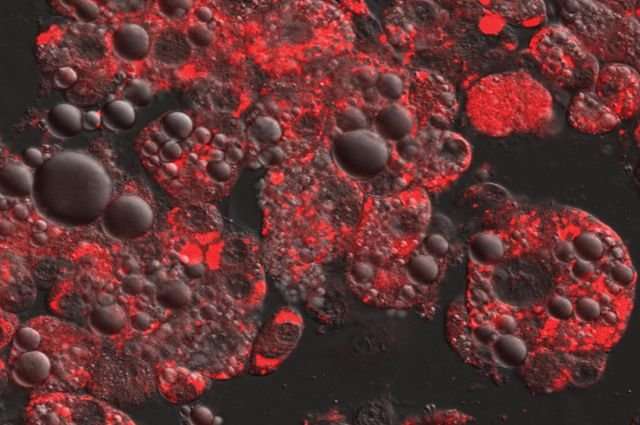Research could change how doctors treat leukemia and other cancers fed by fat

Obesity and cancer risk have a mysterious relationship, with obesity increasing the risk for 13 types of cancer. For some cancers—including pediatric cancers—obesity affects survival rates, which are lower for people who are obese.
With an increasing population of overweight and obese children in the United States, researchers and physicians are racing to understand this connection – and what to do about it.
Dr. Steven Mittelman, chief of pediatric endocrinology at UCLA Mattel Children's Hospital, is among those looking for clues to improve children's survival and recovery from cancer. But unlike most other researchers, Mittelman explores the connection from the perspective of the fat cell, not the cancer cell; he's trying to understand the environment in the body that fat itself cultivates that leaves some people more vulnerable to cancer.
His recent research suggests that important insights can be gained from this approach. A study he led, published in November 2017 in the journal Molecular Cancer Research, suggests that obesity makes chemotherapy drugs much less effective in children with leukemia. The disease is the most common cancer in children and teens, and obese children have a 50 percent higher relapse rate compared to other children.
Mittelman's research, conducted both in mice and in human fat cells, has shown that fat cells attract leukemia cells, which they then feed with amino acids and fats that help the leukemia cells proliferate. The fat cells also fat cells also absorb and metabolize some of the chemotherapy drugs meant to combat leukemia cells, enabling some of the cancer cells to survive.
"These findings are vital for leukemia and a lot of other cancers that grow in the bone marrow or around fat cells," Mittelman said. "If fat cells remove chemotherapy drugs from the environment and allow the cancer cells to survive, we need to find new ways to target cancer cells in patients who are obese."
Mittelman points out that if this research is found applicable to humans, it stands to change not just how doctors treat leukemia, but how they treat other cancers that are also fed by fat, such as cancers of the breast, colon, ovary and pancreas.
"Understanding how metabolic pathways contribute to human disease—and how they can be harnessed—is essential in our search for new diagnostic methods, new preventive approaches, new treatments and even cures," said Dr. Orian Shirihai, who leads the metabolism research theme at UCLA. "Nowhere is that more clear than in our exploration of the cancer-and-metabolism connection."
Cancer's link to metabolism highlights another element necessary for the advancement of medicine, Shirihai said.
"We bring together researchers and physicians from across disciplines and fields of interest so we can all work toward the same goal," Shirihai says. "This approach is how we will ultimately cure not just cancer, but diabetes and other diseases as well."
Mittelman understands the importance of such collaborations in fully uncovering the mechanisms for the fat-cancer interactions. That's what brought him to UCLA several months ago.
"I came here because there are so many great people to collaborate with," Mittelman said. "You throw a rock and you hit a really smart person."
At UCLA, working with other researchers from cancer, metabolism and nutrition, he can delve deeper to better understand how fat nourishes leukemia cells and how it changes their metabolism. He can also better understand the role of metabolism in the disease process.
"Studying cancer from the perspective of the fat cell is unusual," Mittelman said. "My research uses cells, mice, human samples and epidemiologic data—it spans the gamut."
His ultimate goal of course is to crack how fat supports cancer in humans so that doctors can improve survival and recovery for overweight people with cancer. He hopes, among other things, to grasp how to make chemotherapy more effective without making it too toxic for the body.
"We need to better understand how cancer and fat interact with each other so we can develop better strategies to target cancer," Mittelman said. "When it comes to treating cancers, we can't take a one-size-fits-all approach."
More information: Xia Sheng et al. Adipocytes Sequester and Metabolize the Chemotherapeutic Daunorubicin, Molecular Cancer Research (2017). DOI: 10.1158/1541-7786.MCR-17-0338
Anna M. Butturini et al. Obesity and Outcome in Pediatric Acute Lymphoblastic Leukemia, Journal of Clinical Oncology (2007). DOI: 10.1200/jco.2006.07.7792

















